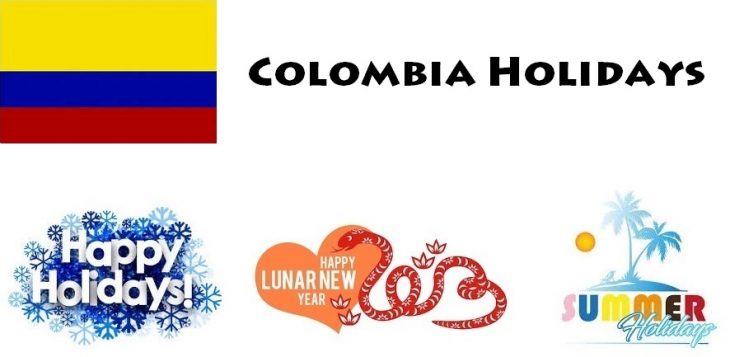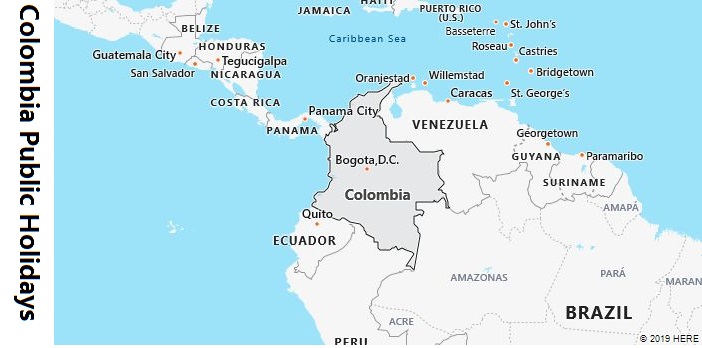Colombia Public Holidays
Colombia Public Holidays
Searching for the national holidays in Colombia? All public holidays in Colombia are treated like Sundays. This means that most of the Colombia employees have a day off and all schools are closed on these office holidays. If you are planning a trip to Colombia and want to know what the national and regional holidays are, check the details in the tables below.
Colombia, a South American country known for its cultural diversity and rich history, celebrates a variety of public holidays throughout the year. These holidays are a reflection of Colombia’s Catholic heritage, national pride, and historical events. Colombia has one of the highest numbers of public holidays in the world, including national holidays, religious holidays, and commemorative days, which are observed with great enthusiasm across the country.
National Public Holidays
National public holidays in Colombia celebrate key historical events, independence movements, and milestones in the country’s political history. These holidays foster a sense of national pride and unity, as Colombians come together to reflect on their shared history and culture.
Independence Day (20th July)
Independence Day, or Día de la Independencia, is the most important national holiday in Colombia. It commemorates the day in 1810 when Colombia declared its independence from Spain. This day marks the beginning of the country’s fight for freedom, which culminated in the full recognition of independence in 1819.
Celebrations:
- Military Parades: Independence Day is marked by grand military parades, especially in the capital city, Bogotá. These parades feature members of the Colombian Armed Forces, police, and other security services, showcasing Colombia’s strength and unity.
- Cultural Performances: Throughout the country, traditional Colombian music, dance performances, and street festivals are organized to celebrate the nation’s heritage. Popular forms of music such as vallenato and cumbia are performed, and traditional dances like bambuco are showcased.
- Fireworks Displays: In the evening, fireworks light up the skies over major cities and towns, with families and communities coming together to enjoy the spectacle.
- Patriotic Displays: Colombian flags are displayed on homes, businesses, and public buildings, and many people wear clothing in the national colors of yellow, blue, and red.
Battle of Boyacá Day (7th August)
Battle of Boyacá Day, or Día de la Batalla de Boyacá, is another significant national holiday in Colombia. It commemorates the Battle of Boyacá, which took place on the 7th of August, 1819, and was a decisive victory in Colombia’s war for independence from Spain.
Key Events:
- Official Ceremonies: The holiday is marked by official ceremonies held at the Boyacá Bridge near Tunja, where the battle took place. Government officials, including the President, deliver speeches to honor the soldiers who fought in the battle and to reflect on Colombia’s independence.
- Military Parades: Similar to Independence Day, military parades are held in major cities to honor the country’s armed forces and celebrate the victory at Boyacá. These parades include displays of military equipment, flyovers by the air force, and marching bands.
- Patriotic Celebrations: Colombians celebrate with a strong sense of national pride, attending local events and engaging in activities that commemorate the significance of the battle and the country’s independence.
Religious Public Holidays
As a predominantly Roman Catholic country, Colombia observes many religious public holidays. These holidays are deeply rooted in Christian traditions and are widely celebrated across the nation. The most significant religious holidays include Christmas, Easter, and other feast days that are part of the Catholic liturgical calendar.
Good Friday (Viernes Santo)
Good Friday is one of the most solemn religious holidays in Colombia. It is observed on the Friday before Easter Sunday and commemorates the crucifixion of Jesus Christ. Good Friday is part of Semana Santa (Holy Week), one of the most important religious periods in the country.
Traditions:
- Processions: Throughout Colombia, especially in cities like Popayán and Mompox, elaborate processions are held on Good Friday. These processions reenact the Stations of the Cross and the Passion of Christ, with participants carrying religious statues, crosses, and candles through the streets.
- Religious Services: Catholics attend special church services on Good Friday, which include readings from the Bible, prayers, and hymns that focus on the suffering and death of Jesus. The services are often solemn and reflective, emphasizing the themes of sacrifice and redemption.
- Fasting and Abstinence: Many Colombians observe Good Friday by fasting or abstaining from meat, in keeping with Catholic traditions. Families typically prepare simple meals, such as fish or vegetarian dishes, to mark the day.
Easter Sunday (Domingo de Pascua)
Easter Sunday, or Domingo de Pascua, is the joyful celebration of the resurrection of Jesus Christ, marking the end of Holy Week and the Lenten season. It is a significant religious holiday in Colombia, celebrated with family gatherings, church services, and festive meals.
Celebrations:
- Mass Services: Easter Sunday begins with special mass services in churches across the country. These services are marked by a celebratory tone, with hymns, prayers, and the ringing of church bells to symbolize the resurrection of Christ.
- Family Meals: Colombians celebrate Easter with large family gatherings and festive meals. Traditional dishes such as ajiaco (a chicken and potato soup) and buñuelos (fried cheese dough) are commonly prepared for the occasion.
- Egg Hunts and Decorations: While Easter egg hunts are not as widespread in Colombia as in some other countries, they are becoming increasingly popular in urban areas, particularly among children. Homes are often decorated with flowers and other symbols of renewal and life.
Christmas Day (25th December)
Christmas, or Navidad, is one of the most widely celebrated holidays in Colombia. It is both a religious and cultural event that brings families together for festive activities, church services, and special meals. In Colombia, the Christmas season begins in early December and continues until Día de los Reyes Magos (Epiphany) on January 6th.
Traditions:
- Novenas de Aguinaldo: One of the most important Christmas traditions in Colombia is the Novena de Aguinaldo, a series of prayers and gatherings held on the nine nights leading up to Christmas Eve. Families and friends gather to recite prayers, sing Christmas carols, and share food and gifts.
- Misa de Gallo (Midnight Mass): On Christmas Eve, many Colombians attend Misa de Gallo, or Midnight Mass, to celebrate the birth of Jesus Christ. This is followed by family gatherings and a festive meal.
- Festive Meals: Christmas dinner typically includes traditional Colombian dishes such as lechona (roast pork stuffed with rice and peas), natilla (a sweet custard), and buñuelos. Families exchange gifts and enjoy the festive atmosphere.
- Fireworks and Decorations: Cities and towns across Colombia are beautifully decorated with Christmas lights, nativity scenes, and elaborate displays. Fireworks are often set off on Christmas Eve, adding to the festive spirit.
Feast of the Immaculate Conception (8th December)
The Feast of the Immaculate Conception, or Día de la Inmaculada Concepción, is a religious holiday that celebrates the belief in the Virgin Mary’s immaculate conception. It is observed on the 8th of December and marks the beginning of the Christmas season in Colombia.
Key Traditions:
- Candlelight Processions: In many parts of Colombia, especially in coastal cities like Cartagena and Barranquilla, the holiday is celebrated with candlelight processions and religious ceremonies dedicated to the Virgin Mary.
- La Noche de las Velitas: The night before the Feast of the Immaculate Conception is known as La Noche de las Velitas (The Night of the Candles). Colombians light candles and place them in windows, on balconies, and in public spaces to honor the Virgin Mary. It is a magical sight, with entire neighborhoods illuminated by flickering candles.
- Family Gatherings: Families gather for prayer, food, and celebrations during La Noche de las Velitas. This event often brings communities together, with neighbors sharing food and participating in the lighting of candles.
Commemorative Days
In addition to national and religious holidays, Colombia observes several commemorative days that celebrate its diverse culture, social movements, and international solidarity. These days provide opportunities for reflection on historical events, cultural achievements, and social progress.
Labour Day (1st May)
Labour Day, or Día del Trabajo, is celebrated on the 1st of May in Colombia. It is a day to honor the contributions of workers and to advocate for labor rights, fair wages, and improved working conditions.
Observances:
- Public Demonstrations: Labour unions and workers’ organizations hold marches and rallies in major cities to raise awareness about labor rights and social justice. These events often include speeches by union leaders and political figures.
- Community Events: Many Colombians use the day off to relax with family and friends, attending local community events or enjoying outdoor activities.
Battle of Cartagena (11th November)
The Battle of Cartagena, or Día de la Independencia de Cartagena, commemorates the successful defense of Cartagena against Spanish forces in 1811, during Colombia’s struggle for independence. Cartagena’s victory is seen as a key moment in the broader independence movement.
Celebrations:
- Festivals and Parades: Cartagena celebrates the day with colorful festivals, parades, and reenactments of the battle. The city is alive with music, dance, and fireworks, reflecting its vibrant culture and history.
- Carnival Atmosphere: The celebration takes on a carnival-like atmosphere, with street performers, traditional costumes, and dancing in the streets. The event is a mix of history, culture, and entertainment, attracting both locals and tourists.
Columbus Day (12th October)
Columbus Day, or Día de la Raza, is celebrated on the 12th of October and honors the arrival of Christopher Columbus in the Americas in 1492. In Colombia, this day is used to reflect on the country’s Indigenous heritage and the cultural diversity that defines the nation today.
Traditions:
- Cultural Events: Many cities host cultural events, including Indigenous music and dance performances, art exhibitions, and lectures on the history and impact of colonization. These events promote awareness of Colombia’s Indigenous and Afro-Colombian heritage.
- Educational Programs: Schools and universities often organize programs and discussions about the historical significance of Columbus’s arrival and its impact on Colombia’s development as a multicultural society.















































